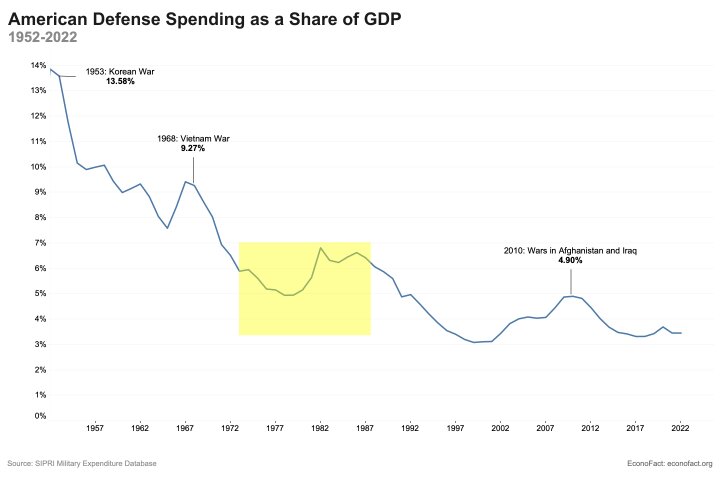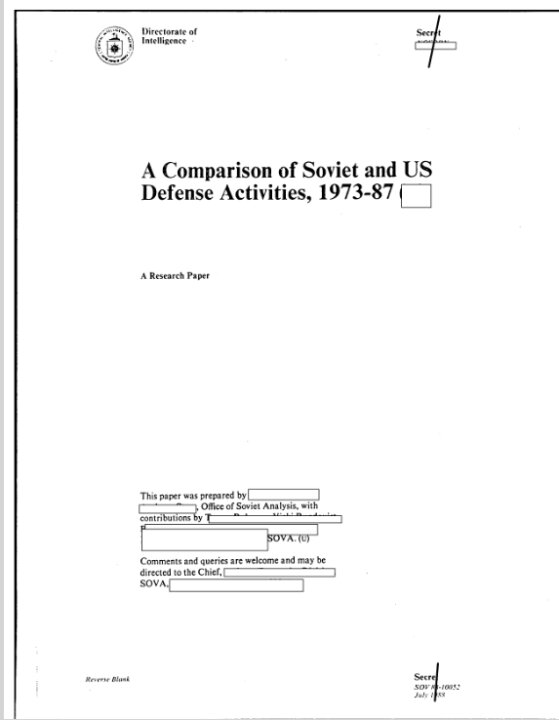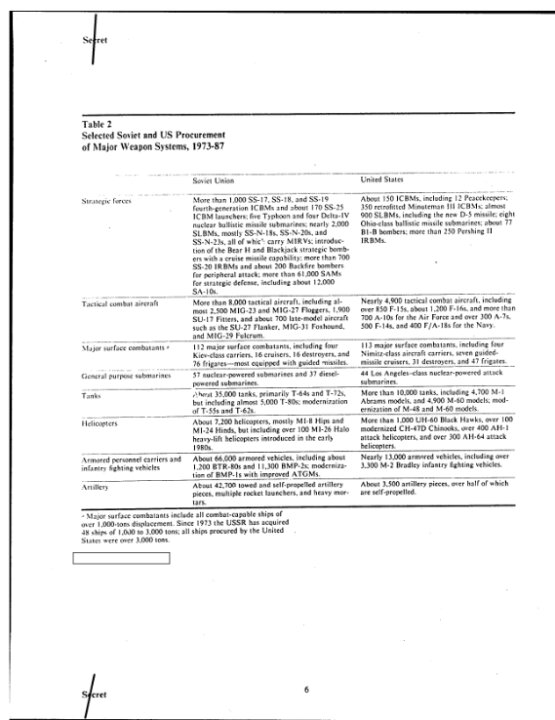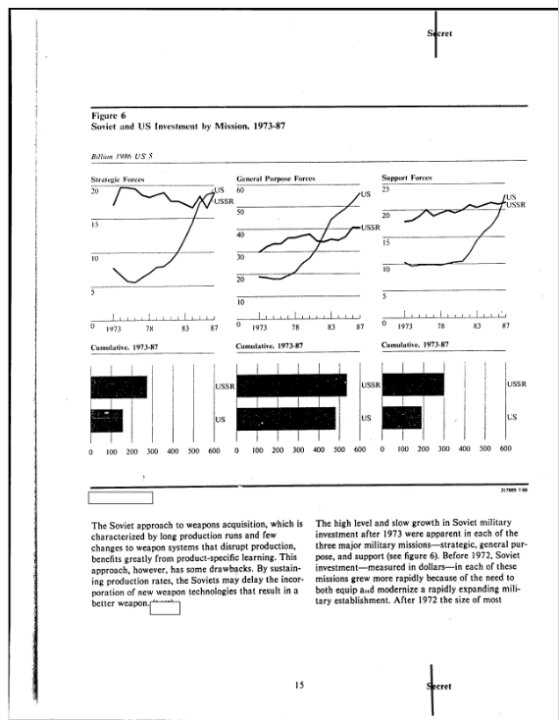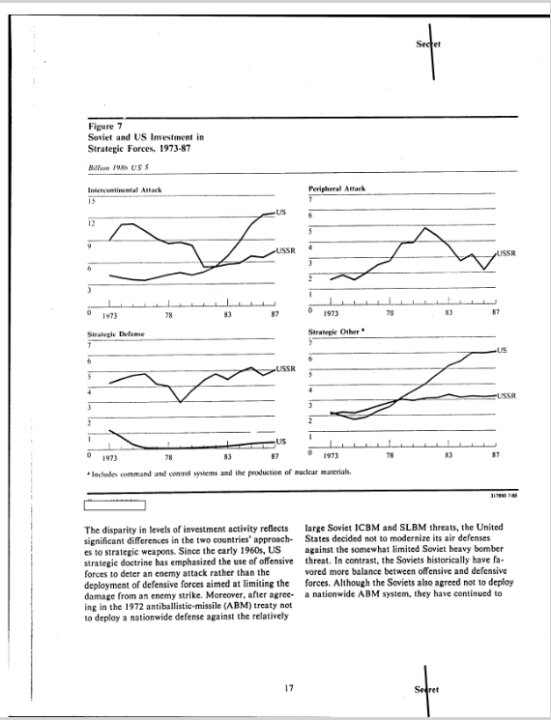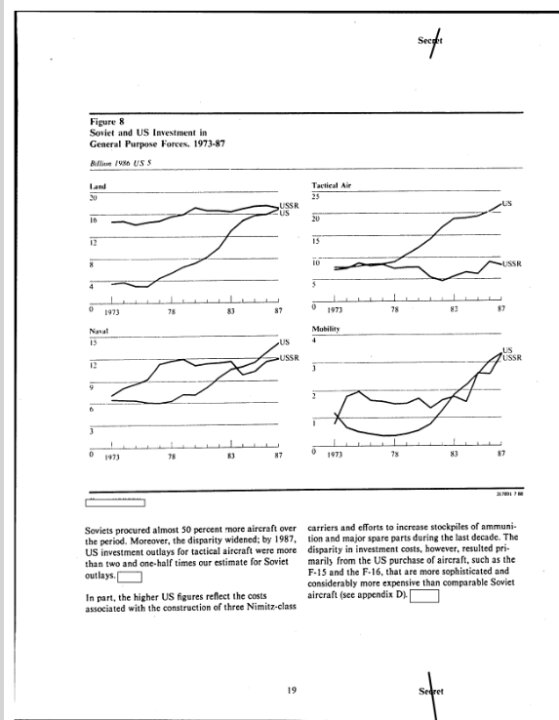LeopoldBloom · M
The new movie about him is a hagiography. He is also responsible for the destructive social policies and Iran-Contra, which probably should have put him in prison.
View 8 more replies »
This comment is hidden.
Show Comment
beckyromero · 36-40, F
@LeopoldBloom
If you haven't noticed by now, @Roundandroundwego spends a lot of time trolling my posts and posting nonsense.
If you haven't noticed by now, @Roundandroundwego spends a lot of time trolling my posts and posting nonsense.
LeopoldBloom · M
@beckyromero I have noticed. I've also noticed that his posts here border on incoherence.
Ronald Reagan's legacy certainly evokes a wide range of opinions across the political spectrum. Supporters credit him with a strong stance against the Soviet Union that contributed to the end of the Cold War, a historic accomplishment that changed global dynamics and lessened the threat of nuclear conflict. His policy of "peace through strength" and his ability to engage in diplomacy with Soviet leaders like Mikhail Gorbachev are often highlighted as pivotal moments in avoiding World War III.
However, it's important to recognize that Reagan's legacy is multi-faceted. While his foreign policy achievements are lauded by many, his domestic policies remain a subject of significant debate. Critics from both the left and right point to issues such as his economic policies, often termed "Reaganomics," which are criticized for increasing income inequality and national debt, as well as his handling of social issues like the AIDS epidemic and civil rights.
Reagan's impact on American politics, both domestically and internationally, is undeniable. Whether admired or criticized, he remains a defining figure whose influence continues to shape discussions on U.S. leadership, diplomacy, and policy. Acknowledging his contributions to ending the Cold War doesn't necessarily negate the critiques of his policies; rather, it offers a comprehensive view of his complex legacy.
However, it's important to recognize that Reagan's legacy is multi-faceted. While his foreign policy achievements are lauded by many, his domestic policies remain a subject of significant debate. Critics from both the left and right point to issues such as his economic policies, often termed "Reaganomics," which are criticized for increasing income inequality and national debt, as well as his handling of social issues like the AIDS epidemic and civil rights.
Reagan's impact on American politics, both domestically and internationally, is undeniable. Whether admired or criticized, he remains a defining figure whose influence continues to shape discussions on U.S. leadership, diplomacy, and policy. Acknowledging his contributions to ending the Cold War doesn't necessarily negate the critiques of his policies; rather, it offers a comprehensive view of his complex legacy.
Elessar · 31-35, M
You didn't win the cold war and you're at 50% odds of losing it in November if Russia gets their agent installed (again, this time without any safeguards).
CountScrofula · 41-45, M
Ronald Reagan is one of the 20th century's greatest monsters.
He set in place the kind of late capitalism that guarantees that each successive generation has less money, property, and fewer opportunities than their parents did.
The huge numbers of immigrants coming from central America is in great part due to his fanatical anti-communism that lead to funding a genuine genocide in Guatemala and some of the most horrific acts of human cruelty in history in Nicaragua with the Contras. He did this while fucking lying to Congress, breaking the law, and doing everything he could to fund genocidal maniacs because he was "tough on communism" Hell, his foreign policy in the Middle East gave us Al Qaeda.
He's the one who first united the economic right and the evangelicals whose deranged policies are literally being implemented as we speak.
I could write for days he's -vile-.
He set in place the kind of late capitalism that guarantees that each successive generation has less money, property, and fewer opportunities than their parents did.
The huge numbers of immigrants coming from central America is in great part due to his fanatical anti-communism that lead to funding a genuine genocide in Guatemala and some of the most horrific acts of human cruelty in history in Nicaragua with the Contras. He did this while fucking lying to Congress, breaking the law, and doing everything he could to fund genocidal maniacs because he was "tough on communism" Hell, his foreign policy in the Middle East gave us Al Qaeda.
He's the one who first united the economic right and the evangelicals whose deranged policies are literally being implemented as we speak.
I could write for days he's -vile-.
BobbyMoeven · 100+, M
JSul3 · 70-79
@BobbyMoeven The truth hurts, doesn't it?
ElwoodBlues · M
I think winning the Cold War began with the Berlin Airlift if not earlier. I think 30 years of presidents and policy won the Cold War. I don't know of anything that singles Reagan out as a more assiduous cold warrior than any of the others. It was an economic battle; we spent them into oblivion.

P.S. two factors that hollowed our our middle class got rolling under Reagan: the weakening of unions, and the offshoring of manufacturing.

P.S. two factors that hollowed our our middle class got rolling under Reagan: the weakening of unions, and the offshoring of manufacturing.
beckyromero · 36-40, F
@ElwoodBlues
On military spending, yes.
Which ramped up during the Reagan years after reductions when we pulled out of Vietnam.
The 1940s was World War II. The 50s? Korea. The 60s? Vietnam.
See:
Also, you need to take into account that the Soviets (like China now) get "more bang for their buck" (or rather, rubles), so to speak, do to our higher standard of living (and therefore more costly defense procurements).
There's no harm in sharing the below data from a now declassified CIA report on U.S. and Soviet spending.
(Read that Trumpets? I'm not sharing SECRET data, unlike ex-president Trump).
Look at Ford/Carter years and then at the Reagan years.
It was an economic battle; we spent them into oblivion.
On military spending, yes.
Which ramped up during the Reagan years after reductions when we pulled out of Vietnam.
The 1940s was World War II. The 50s? Korea. The 60s? Vietnam.
See:
Also, you need to take into account that the Soviets (like China now) get "more bang for their buck" (or rather, rubles), so to speak, do to our higher standard of living (and therefore more costly defense procurements).
There's no harm in sharing the below data from a now declassified CIA report on U.S. and Soviet spending.
(Read that Trumpets? I'm not sharing SECRET data, unlike ex-president Trump).
Look at Ford/Carter years and then at the Reagan years.
AthrillatheHunt · 51-55, M
He was a good president.
Nitedoc · 51-55, M
@AthrillatheHunt He freed the American hostages held in Iran.
@Nitedoc Not quite.
President Ronald Reagan is often associated with the release of the American hostages in Iran because they were released on January 20, 1981, the day he was inaugurated. However, the circumstances surrounding the release were more complex and primarily involved actions taken during the administration of President Jimmy Carter.
Key Points about the Hostage Crisis and Release:
Hostage Crisis Overview:
The Iran Hostage Crisis began on November 4, 1979, when 52 American diplomats and citizens were taken hostage by Iranian militants who seized the U.S. Embassy in Tehran. The crisis lasted for 444 days.
Negotiations Led by Carter Administration:
President Jimmy Carter's administration was actively involved in negotiating the hostages' release throughout 1980. The U.S. imposed economic sanctions and froze Iranian assets to pressure Iran to release the hostages.
The turning point came with the Algiers Accords, an agreement brokered through Algerian intermediaries, where the U.S. agreed to unfreeze Iranian assets and promised not to interfere in Iran's internal affairs.
Timing of the Release:
The hostages were released on January 20, 1981, just minutes after Ronald Reagan was sworn in as president. This timing was perceived by many as a final snub to President Carter, who had lost his re-election bid in part due to the ongoing crisis.
Impact of Reagan's Election:
There is some speculation that the Iranian government chose to delay the release of the hostages until Reagan's inauguration to avoid giving Carter any credit. Reagan was perceived as a more hardline opponent of Iran, and the change in administration may have influenced their decision.
Reagan's Role:
While Reagan did benefit politically from the timing of the hostages' release, there is no concrete evidence to suggest that his administration directly facilitated or negotiated the release. The groundwork for the release was laid by Carter’s administration.
Conclusion:
While President Reagan is often linked to the release of the American hostages in Iran because it occurred on his inauguration day, the actual negotiations and diplomatic efforts that led to their release were conducted under President Jimmy Carter. The timing of the release may have been a symbolic move by Iran, but Reagan's administration did not play a direct role in the negotiation process.
President Ronald Reagan is often associated with the release of the American hostages in Iran because they were released on January 20, 1981, the day he was inaugurated. However, the circumstances surrounding the release were more complex and primarily involved actions taken during the administration of President Jimmy Carter.
Key Points about the Hostage Crisis and Release:
Hostage Crisis Overview:
The Iran Hostage Crisis began on November 4, 1979, when 52 American diplomats and citizens were taken hostage by Iranian militants who seized the U.S. Embassy in Tehran. The crisis lasted for 444 days.
Negotiations Led by Carter Administration:
President Jimmy Carter's administration was actively involved in negotiating the hostages' release throughout 1980. The U.S. imposed economic sanctions and froze Iranian assets to pressure Iran to release the hostages.
The turning point came with the Algiers Accords, an agreement brokered through Algerian intermediaries, where the U.S. agreed to unfreeze Iranian assets and promised not to interfere in Iran's internal affairs.
Timing of the Release:
The hostages were released on January 20, 1981, just minutes after Ronald Reagan was sworn in as president. This timing was perceived by many as a final snub to President Carter, who had lost his re-election bid in part due to the ongoing crisis.
Impact of Reagan's Election:
There is some speculation that the Iranian government chose to delay the release of the hostages until Reagan's inauguration to avoid giving Carter any credit. Reagan was perceived as a more hardline opponent of Iran, and the change in administration may have influenced their decision.
Reagan's Role:
While Reagan did benefit politically from the timing of the hostages' release, there is no concrete evidence to suggest that his administration directly facilitated or negotiated the release. The groundwork for the release was laid by Carter’s administration.
Conclusion:
While President Reagan is often linked to the release of the American hostages in Iran because it occurred on his inauguration day, the actual negotiations and diplomatic efforts that led to their release were conducted under President Jimmy Carter. The timing of the release may have been a symbolic move by Iran, but Reagan's administration did not play a direct role in the negotiation process.
Nitedoc · 51-55, M
@FrogManSometimesLooksBothWays I've never heard that story before.
Burnley123 · 41-45, M
For sure, he avoided WW3 and in fact deserves serious credit for scaling back the nuclear arms race with Gorbachev.
Does this exempt him from all other criticism?
Like Thatcher in the UK, Reagan brought in neoliberalism and greatly increased wealth inequality. How many people died due to poverty because of Reaganite policies?
No doubt: a lot
I really don't like this habit of revising the reputations of past right-wingers just because
Does this exempt him from all other criticism?
Like Thatcher in the UK, Reagan brought in neoliberalism and greatly increased wealth inequality. How many people died due to poverty because of Reaganite policies?
No doubt: a lot
I really don't like this habit of revising the reputations of past right-wingers just because
beckyromero · 36-40, F
@Burnley123
I would counter than we missed opportunities, such as after the Soviet withdrawl of Afghanistan.
We wouldn't have been an "occupier" but a "liberator" and a "friend."
For pennies on the dollar of what we eventually spent, we could have build schools, roads, hospitals, etc., and prevented Taliban rule as their sanctuary of Osama bin Laden.
Iraq is a bit more complicated but most of the country was not "radicalized" and again we missed opportunities to be a "liberator" rather than a "conquerer."
Iran is a whole different animal, given our history going back to Eisenhower. And with it sharing borders with both Iraq and Afghanistan, it is easier for Iran to forment radicalization in both countries.
Change has to come from within. Invading countries has only strengthened the appeal of radical islam.
I would counter than we missed opportunities, such as after the Soviet withdrawl of Afghanistan.
We wouldn't have been an "occupier" but a "liberator" and a "friend."
For pennies on the dollar of what we eventually spent, we could have build schools, roads, hospitals, etc., and prevented Taliban rule as their sanctuary of Osama bin Laden.
Iraq is a bit more complicated but most of the country was not "radicalized" and again we missed opportunities to be a "liberator" rather than a "conquerer."
Iran is a whole different animal, given our history going back to Eisenhower. And with it sharing borders with both Iraq and Afghanistan, it is easier for Iran to forment radicalization in both countries.
Burnley123 · 41-45, M
@beckyromero In Afghanistan, America really never had control of the whole country. The locals were with the Taliban so an almost unwinnable political situation.
That may have been a different issue but we are talking about whether the invasions of Iraq and Afghanistan were ever likely to succeed. America did spend money in regions it controlled and people in the Kabul region (women especially) benefitted. The rest of the country: different matter.
It became more radicalised after the invasion, with Isis emerging in it's northern border. The reconstruction was handled abysmally but we might never know what might have happened.
Well over a million people have died as a direct result of these wars. America (and Britain) shouldn't be playing world policeman and should not be empire-building.
I would counter than we missed opportunities, such as after the Soviet withdrawl of Afghanistan.
That may have been a different issue but we are talking about whether the invasions of Iraq and Afghanistan were ever likely to succeed. America did spend money in regions it controlled and people in the Kabul region (women especially) benefitted. The rest of the country: different matter.
Iraq is a bit more complicated but most of the country was not "radicalized" and again we missed opportunities to be a "liberator" rather than a "conquerer."
It became more radicalised after the invasion, with Isis emerging in it's northern border. The reconstruction was handled abysmally but we might never know what might have happened.
Well over a million people have died as a direct result of these wars. America (and Britain) shouldn't be playing world policeman and should not be empire-building.
beckyromero · 36-40, F
@Burnley123
WIth respect to Reagan's handling of Afghanistan, that is where we missed the opportunity after he left office.
George H. W. Bush and Congress wanted a "peace dividend" and had little foresight in why it would have been a good idea to aid Afghanistan.
As for the second invasion of Iraq, you know I agree with you on how we utterly mismanaged the post-war (i.e. Bremer, disbanding the Iraqi army, etc.), acknowledging that you were against going to war.
As for the first one, well, you know how I feel about that, too. 😉
And with the military action against Afghanistan after 9/11, that was Donald Rumsfeld idea. Cheap, cheap, cheap. We should have been able to stop Osama bin Laden from escaping with proper planning.
But, no! Rumsfeld wanted to use the Northern Alliance. That would have been like asking the banned Labour-Farmer Party to overthrow the Japanese government after the attack on Pearl Harbor.
WIth respect to Reagan's handling of Afghanistan, that is where we missed the opportunity after he left office.
George H. W. Bush and Congress wanted a "peace dividend" and had little foresight in why it would have been a good idea to aid Afghanistan.
As for the second invasion of Iraq, you know I agree with you on how we utterly mismanaged the post-war (i.e. Bremer, disbanding the Iraqi army, etc.), acknowledging that you were against going to war.
As for the first one, well, you know how I feel about that, too. 😉
And with the military action against Afghanistan after 9/11, that was Donald Rumsfeld idea. Cheap, cheap, cheap. We should have been able to stop Osama bin Laden from escaping with proper planning.
But, no! Rumsfeld wanted to use the Northern Alliance. That would have been like asking the banned Labour-Farmer Party to overthrow the Japanese government after the attack on Pearl Harbor.
Bumbles · 56-60, M
I did not like Reagan for the reasons I mentioned on another post. His goal wasn’t to end the Soviet Union, and there is debate about how much the US arms build up was a factor. There is no debate there were several reasons.
“What we seek in our relationship with the Soviet Union is peace and stability.” Ronald Reagan, August 12, 1987
“What we seek in our relationship with the Soviet Union is peace and stability.” Ronald Reagan, August 12, 1987
JSul3 · 70-79
He severely cut the tax rates and we have never recovered from it since.
His 'trickle down' policy was simply the uber wealthy relieving themselves upon those below them on the economic chain.
He destroyed the Air Traffic Controllers Union.
His 'trickle down' policy was simply the uber wealthy relieving themselves upon those below them on the economic chain.
He destroyed the Air Traffic Controllers Union.
BohoBabe · M
The Cold War was entirely created by America. During that time, Russia and China were having their own Cold War with each other, neither were that concerned with America.
BohoBabe · M
@Burnley123 Yeah, the USSR was imperialist even before they joined WWII. It was always an authoritarian and imperialist dictatorship. My only point is that they weren't concerned with America, they were concerned with China. The Cold War was largely a propaganda campaign by politicians who were using wokeness... I mean... the threat of Communism... to gain attention and support from a scared public. Thankfully, things aren't still like that.
Burnley123 · 41-45, M
@BohoBabe Your point isn't really true.
The USSR was very much concerned with it's rivalry with America and also used that to quell domestic dissent. Back then, china wasn't a super-power. It was a nation that the USSR expected to be subordinate but wasn't.
Chomsky once said that the cold war was really a war between the USSR and it's satellite states and between America and the third world. There is some truth in that
The USSR was very much concerned with it's rivalry with America and also used that to quell domestic dissent. Back then, china wasn't a super-power. It was a nation that the USSR expected to be subordinate but wasn't.
Chomsky once said that the cold war was really a war between the USSR and it's satellite states and between America and the third world. There is some truth in that
BohoBabe · M
@Burnley123
Yes, that's what caused their Cold War. It didn't matter that China wasn't nearly as strong as the Soviet Union or America. The USSR still saw China as a threat that was right next door. Of course the USSR didn't like or trust America either, but America wasn't the country they shared a border with.
Back then, china wasn't a super-power. It was a nation that the USSR expected to be subordinate but wasn't.
Yes, that's what caused their Cold War. It didn't matter that China wasn't nearly as strong as the Soviet Union or America. The USSR still saw China as a threat that was right next door. Of course the USSR didn't like or trust America either, but America wasn't the country they shared a border with.
Roundandroundwego · 61-69
Or not. My generation always said Reagan helped You to avoid the peace dividend. He also avoided solar panels. Literally. By YOU I mean that nation of conservatives who killed the peace dividend.
beckyromero · 36-40, F
@Roundandroundwego
Saddam Hussein in 1990 and later 19 hijackers in 2001 are the ones who killed the "peace dividend."
Saddam Hussein in 1990 and later 19 hijackers in 2001 are the ones who killed the "peace dividend."
Roundandroundwego · 61-69
@beckyromero everyone said it was otherwise before that. Whatever! You were there, not us. Lies corrected history.
This comment is hidden.
Show Comment
rinkydinkydoink · M
beckyromero · 36-40, F
@JSul3
(Sighs)
Lt. Col. Oliver North did NOT, repeat, did NOT go to prison.
And while North said he thought the idea of sending arms sales to Iran to get U.S. hostages out of Lebanon and marking-up the price of those weapons to illegally fund the Contras in Nicaragua was a "neat idea," it was Manucher Ghorbanifar, an expatriate Iranian arms dealer, who proposed the arms for hostages swap.
Robert McFarlane, the National Security Adviser, was already getting other countries to send financial aid to the Contras as early as 1984. Then in March of 1986 Ghorbanifar allegedly suggested to George Cave of the CIA the idea of marking-up the weapons sales to help aid the Contras. North then wrote a memo proposing this the following month to the new NSA, John Poindexter.
Iran Contra? Oliver North took the fall, and went to prison — and he claimed that he was the mastermind behind both parts of this scheme.
(Sighs)
Lt. Col. Oliver North did NOT, repeat, did NOT go to prison.
And while North said he thought the idea of sending arms sales to Iran to get U.S. hostages out of Lebanon and marking-up the price of those weapons to illegally fund the Contras in Nicaragua was a "neat idea," it was Manucher Ghorbanifar, an expatriate Iranian arms dealer, who proposed the arms for hostages swap.
Robert McFarlane, the National Security Adviser, was already getting other countries to send financial aid to the Contras as early as 1984. Then in March of 1986 Ghorbanifar allegedly suggested to George Cave of the CIA the idea of marking-up the weapons sales to help aid the Contras. North then wrote a memo proposing this the following month to the new NSA, John Poindexter.
JSul3 · 70-79
@beckyromero He was given a three-year suspended prison term, two years probation, $150,000 in fines, and 1,200 hours of community service.
beckyromero · 36-40, F
@JSul3
I know the sentence North got. I also know it was vacated by the D.C. Circuit because of the immunity he had received from Congress.
I also know that he did not go to prison - as you stated he did.
I think what North did was wrong. But let's stick to the facts.
He was given a three-year suspended prison term, two years probation, $150,000 in fines, and 1,200 hours of community service.
I know the sentence North got. I also know it was vacated by the D.C. Circuit because of the immunity he had received from Congress.
I also know that he did not go to prison - as you stated he did.
I think what North did was wrong. But let's stick to the facts.
accidentprone · 31-35, M
Listen to any speech from Reagan, it will be inspiring, uplifting, and optimistic to the future.
Those that hated him, hate the USA, will always hate the USA, and always seek to destroy it by anyway possible.
Those that hated him, hate the USA, will always hate the USA, and always seek to destroy it by anyway possible.
accidentprone · 31-35, M
@beckyromero He offers prosperity to those that want to integrate into the USA, and become USA citizens.
He does not condone those that want to hibernate into cultural zones that do not want to assimilate, and become USA first Americans. i
He does not condone those that want to hibernate into cultural zones that do not want to assimilate, and become USA first Americans. i
This comment is hidden.
Show Comment
He taught us that ketchup is a vegetable, and for that we are grateful. ✌ 🇺🇸
Jimmy2016 · 61-69, M
🤔..........Ronald Reagan - Was the start of the downfall of America.......
This comment is hidden.
Show Comment
Zonuss · 46-50, M
They like him last time I checked.☺
LordShadowfire · 46-50, M
I'll give him credit for that. I just don't like what he tried to do to school lunches. He actually tried to have ketchup declared a vegetable.











